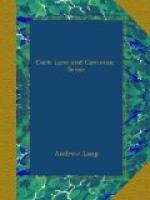There were regular, and, so to speak, orthodox oracles of the dead. They might be consulted by such as chose to sleep on tombs, or to visit the cavern of Trophonius, or other chasms which were thought to communicate with the under world. But the idea of bringing a shade, or a hero, a demon, or a god into a private room, as in modern spiritualism, meets us late in such works as the Letter of Porphyry, and the Reply of Iamblichus, written in the fourth century of our era. If we may judge by the usual fortune of folklore, these private spiritualistic rites, without temple, or state-supported priestly order, were no new things in the early centuries of Christianity, but they had not till then occupied the attention of philosophers and men of letters. The dawn of our faith was the late twilight of the ancient creeds, the classic gods were departing, belief was waning, ghosts were walking, even philosophers were seeking for a sign. The mysteries of the East had invaded Hellas. The Egyptian theory and practice were of special importance. By certain sacramental formulas, often found written on papyrus, the gods could be constrained, and made, like mediaeval devils, the slaves of the magician. Examples will occur later. This idea was alien to the Greek mind, at least to the philosophic Greek mind. The Egyptians, like Michael Scott, had books of dread, and an old Egyptian romance turns on the evils which arose, as to William of Deloraine, from the possession of such a volume. {63} Half-understood strings of Hebrew, Syriac, and other ‘barbarous’ words and incantations occur in Greek spells of the early Christian age. Again, old Hellenic magic rose from the lower strata of folklore into that of speculation. The people, the folk, is the unconscious self, as it were, of the educated and literary classes, who, in a twilight of creeds, are wont to listen to its promptings, and return to the old ancestral superstitions long forgotten.
The epoch of the rise of modern spiritualism was analogous to that when the classical and oriental spiritualism rose into the sphere of the educated consciousness In both periods the marvellous ‘phenomena’ were practically the same, and so were the perplexities, the doubts, the explanatory hypotheses of philosophical observers. This aspect of the modern spiritualistic epidemic did not escape attention. Dr. Leonard Marsh, of the University of Vermont, published, in 1854, a treatise called The Apocatastasis, or Progress Backwards. He proved that the marvels of the Foxes, of Home, and the other mediums, were the old marvels of Neoplatonism. But he draws no conclusion except that spiritualism is retrogressive. His book is wonderfully ill-printed, and, though he had some curious reading, his style was cumbrous, jocular, and verbose. It may, therefore, be worth while, in the light of anthropological research, to show how very closely human nature has repeated its past performances.




